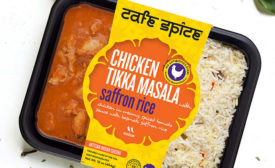Ingredients
Product Focus | Peppers & Spices
Moving beyond traditional peppers and spices
Food companies and chefs get creative as they heat up their offerings.
Read More
Tech | Ingredients
A simpler, cleaner marinade
The shift toward clean labels requires fewer but more effective ingredients.
Read More
Product Focus | Global Ingredients
Indian cuisine provides a wealth of flavorful possibilities
Café spice turns a complex cuisine into award-winning refrigerated entrees.
Read More
Product Focus | Functional Ingredients
Functional Ingredients Promote Product Quality and Safety
Read MoreStay ahead of the curve. Unlock a dose of cutting-edge insights.
Receive our premium content directly to your inbox.
SIGN-UP TODAYCopyright ©2024. All Rights Reserved BNP Media.
Design, CMS, Hosting & Web Development :: ePublishing













